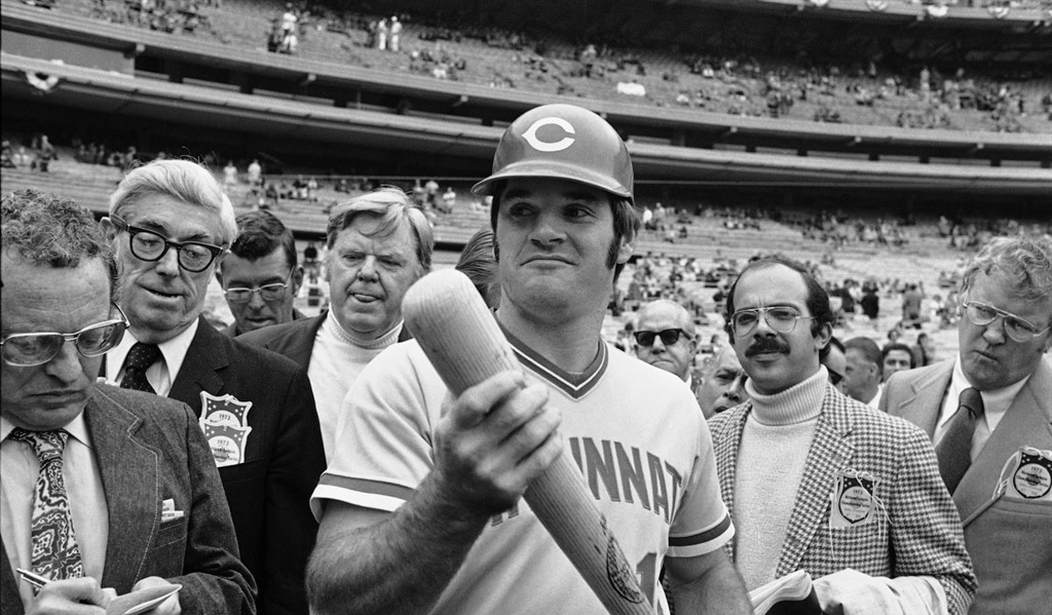Pete Rose's biggest overall mistake, of course, was gambling on baseball. But his biggest PR mistake was admitting to it in 2004.
Plausible deniability is a powerful commodity.
Since August 24, 1989, Pete Rose has been banned for life from Major League Baseball (MLB). Rose always claimed that he took a plea deal under the agreement that he could apply for reinstatement after one year. Alas, the MLB commissioner, Bart Giamatti, died just eight days after announcing Rose’s lifetime suspension. Subsequent GMs have been reluctant to overrule their deceased predecessor.
And now, even after the passing of Pete Rose earlier this week at the age of 83, he remains banned for life. It wasn’t just a “lifetime” ban; this was a forever ban.
Still, since the end of the 1980s, media members were begging Rose to simply come clean: “Admit that you gambled! The evidence is overwhelming! Stop lying about it, tell the truth, and you’ll surely be reinstated! Don’t you wanna make it to the Hall of Fame in Cooperstown?”
So, that’s what Rose did. After 15 years of vehemently denying any wrongdoing whatsoever, Rose finally told the truth. His 2004 book, “My Prison Without Bars,” marked the very first time that Rose publicly admitted to gambling on MLB games — including Cincinnati Reds games, which was especially problematic since he was the manager of the Reds and could influence the outcome of contests.
Rose tried to justify it by arguing that he always bet on the Reds to win, so it wasn’t like he was throwing games. But baseball seasons are exceptionally long and grueling; it’s very easy for a manager to prioritize winning one game over another via relief pitchers, switch hitters and runners, and other managerial decisions. If Rose desperately wanted to win on a Monday, he could allocate all the resources necessary ASAP, even if it meant his team would be at a depth disadvantage on Tuesday, Wednesday, and Thursday.
But a curious thing happened when Rose finally admitted to gambling on baseball: The passion of his supporters vanished overnight.
Before, they could always point to Rose’s steadfast denials. “Hey, you weren’t there! You never know!” But afterward, the truth was no longer in doubt. (Also, opting to finally come clean in a for-profit book Rose was trying to monetize might not have been the best optics for a mea culpa.)
All his supporters had left was the hypocrisy argument (“others have done far worse and not been banned!”), public sympathy, and the career accomplishments of baseball’s all-time hit leader. And that’s not nothing — there’s certainly PR value in the mix — but it was never anywhere close to being enough. Never again was Rose seriously considered for reinstatement.
Today in 2024, most professional sports — including MLB — have embraced gambling (FanDuel is the “new official sports betting partner” for Major League Baseball). Las Vegas even hosts multiple professional sports teams. The public’s perception of gambling has changed dramatically.
If Rose had played his cards differently (and given his propensity for gambling, I have a feeling he played cards pretty frequently), he could’ve written an ending to his autobiography that actually landed him in Cooperstown. Here’s what he should’ve done:
From the beginning, Rose should’ve fallen on the sword of being a gambling addict. That was his out: He had an addiction.
Addicts aren’t necessarily violent, evil, or wicked. They’re just human. Sometimes, very good, decent people can fall prey to addictions. There’s not an MLB locker room that hasn’t had to deal with addictive behavior — drugs, alcohol, gambling, and more.
Indeed, shortly after Rose’s death, The Nation released an article, “Gambling Is an Addiction. So Why Was Pete Rose an Outcast?”
When it comes to supporting our sports heroes, we all think like WWE fans: We create our own version of reality — a strange combination of facts, stats, bulls**t, and kayfabe — and base our hopes and dreams on this perception. It’s the reason why all sports fans are optimistic on opening day: “This could be our year!”
Even though it probably won’t be.
By admitting to lying, Rose defanged his supporters. He ruined the “alternate reality” that had formed in their minds. And sadly, that was his fatal dealbreaker: We’ll forgive our heroes for breaking our hearts. But breaking our spirits and shattering our reality is a bridge too far.
Even for Charlie Hustle.









Join the conversation as a VIP Member